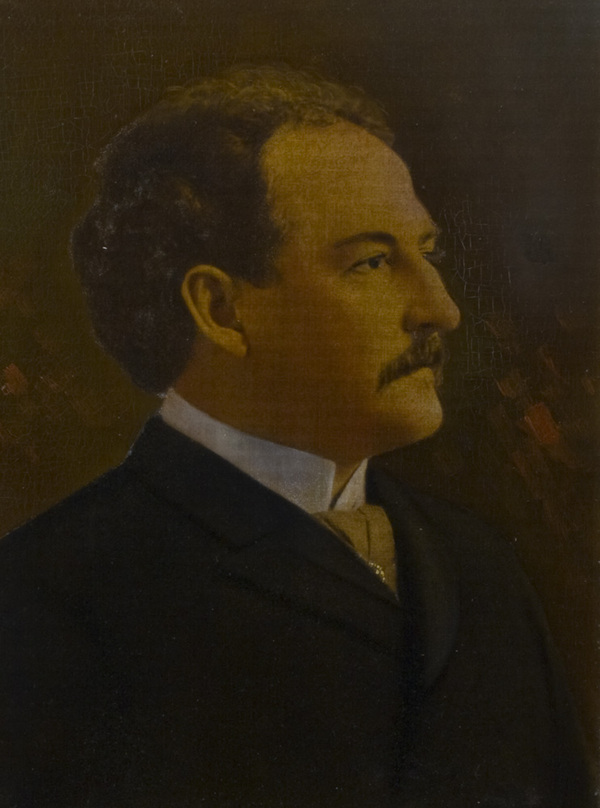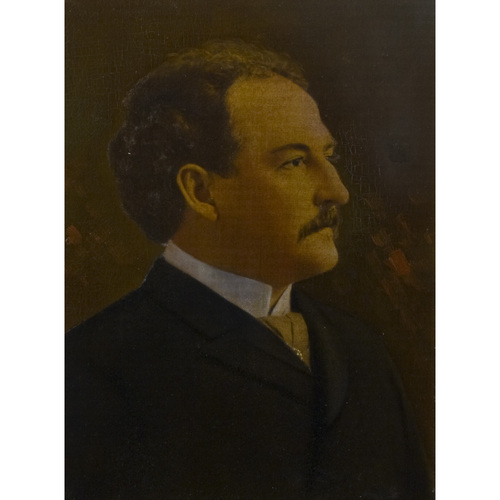
Source: Link
MARKS, GEORGE THOMAS, businessman, office holder, and politician; b. 31 Aug. 1856 in Bruce Mines, Upper Canada, son of George Marks and Mary Traynor; m. first 23 Aug. 1881 Jennie (Jane) Laird in Prince Arthur’s Landing (later Port Arthur and now Thunder Bay), Ont.; they had no surviving children; m. secondly 26 Oct. 1898 Mary Elizabeth Rowan in Winnipeg, and they had a son and a daughter; d. 21 May 1907 in Toronto.
Born to a Protestant Irish family noted for breaking the company-store monopoly at Bruce Mines, in the Algoma District, George Marks settled in Prince Arthur’s Landing in 1873 after attending Trinity College School in Port Hope. For several years he worked as a bookkeeper, agent, or director in various family enterprises, including the Thunder Bay Dock, Forwarding and Elevator Company, the Prince Arthur’s Landing and Kaministiquia Railway, and the Thunder Bay Colonization Railway and its successor, the Port Arthur, Duluth and Western Railway. His admission to partnership in Thomas Marks and Company in 1884, along with his cousin Harold Andrew Wiley, marked his emergence from the shadow of his prominent uncle, Thomas Marks*.
George Marks’s political apprenticeship – he was treasurer of the municipality of Shuniah (1875–77), Shuniah councillor (1879–81), and Port Arthur councillor (1885–87) – prepared him for the seven years (1893–99) he would spend as mayor of Port Arthur, when the town was in dire straits. Its economy had been wrecked by the collapse of silver-mining in the district and the Canadian Pacific Railway’s preference for east Fort William (Thunder Bay) as its Lake Superior terminus. To secure its position as western Algoma’s commercial centre, Port Arthur had indebted itself by subsidizing two local railways in 1875 and 1889 and the CPR in 1883. Costliest of all had been the construction to West Fort William of Canada’s first municipally owned electric street railway, which opened in March 1892. As mayor, Marks had to sustain a dispirited town, its ratepayers factious and ready to challenge every irregularity. He none the less established the Electric Railway and Light Commission (1895) and a municipal electric-lighting plant, consolidated Port Arthur’s crushing debt (1897), redefined the town’s water limits, addressed the sale for taxes of land owned by non-residents, and settled a long-standing tax dispute with the CPR (1899). As well, he supported the Kakabeka Falls power scheme of Edward Spenser Jenison and the efforts of railway entrepreneurs William Mackenzie* and Donald Mann* in securing subsidies from the town and the Ontario government for the Ontario and Rainy River Railway (1897–99).
Despite this record of service, resentment of Thomas Marks’s “multitudinous kindred” was never far below the surface in a working-class town. Just as George’s pleas for caution and compromise with the CPR had hurt him in the 1888 municipal election, so rumours that he might profit from aiding Mackenzie and Mann contributed to his defeat in 1900. As the Conservative candidate in Thunder Bay and Rainy River in the 1904 federal election, Marks did reasonably well considering the identification of Liberal candidate James Conmee* with Sir Wilfrid Laurier*’s popular transcontinental railway policy and the emergence of a strong labour vote in Fort William.
Economic recovery at the Lakehead, fuelled by railway construction and the western wheat boom, undoubtedly benefited Marks as a large landowner in both Port Arthur and Fort William. Handsome, affable, and energetic, the six-foot two-inch Marks might have become a significant force in the shipping of grain on the Great Lakes. In 1894 the Markses, owners since 1888 of the Algonquin, the first steel bulk freighter in the Canadian lake trade, merged with Toronto shippers to form the St Lawrence and Chicago Steam Navigation Company Limited. In 1903 George Marks and the Wileys (Harold Andrew and Franklin Samuel) formed the Canadian North West Steamship Company and Neebing Navigation Limited to run the lake-carrier Neebing. By 1907 Marks had become vice-president of the Dominion Marine Association.
George Marks was an early advocate of amalgamating Fort William and Port Arthur, and his untimely death in 1907 deprived the Lakehead of an important leader, one who saw beyond parochial bickering.
AO, RG 21, Shuniah Township, council minutes. St John the Evangelist Anglican Church (Thunder Bay, Ont.), RBMB (mfm. at NA). Thunder Bay Hist. Museum Soc., photographs of G. T. Marks. Daily Sentinel (Port Arthur [Thunder Bay]), 16, 29 Dec. 1885; 14 Jan. 1888; 29 March 1890; 12, 19 Aug. 1891; 5, 12 April, 22 Dec. 1893. Daily Times-Journal (Fort William [Thunder Bay]), 5 April 1890; 13 Jan. 1899; 10 July 1900; 8 Jan., July, 17 Oct., November 1903; 4 Nov. 1904; 22 May 1907. Globe, 22 May 1907: 14. Globe and Mail, 1 Nov. 1949: 4. Weekly Herald and Algoma Miner (Port Arthur), 20 Dec. 1884, 1 Jan. 1886, 14 Jan. 1888, 1894–1900. Weekly Sentinel (Port Arthur), 26 Aug. 1881, 9 May 1884, 6 Jan. 1893, 5 Jan. 1894. [M.] E. Arthur, “Inter-urban rivalry in Port Arthur and Fort William, 1870–1907,” Western Canada, past and present, ed. A. W. Rasporich (Calgary, 1975), 58–68, 207–9. Canadian Electrical News (Toronto), 4 (July 1894). Ont., Statutes, 1895, c.73; 1897, c.74; 1899 (2nd session), c.73; 1900, c.86. Railway and Marine World (Toronto), June 1903: 203; September 1903: 325; February 1907: 125; June 1907: 421, 435.
Cite This Article
F. Brent Scollie, “MARKS, GEORGE THOMAS,” in Dictionary of Canadian Biography, vol. 13, University of Toronto/Université Laval, 2003–, accessed February 21, 2026, https://www.biographi.ca/en/bio/marks_george_thomas_13E.html.
The citation above shows the format for footnotes and endnotes according to the Chicago manual of style (16th edition). Information to be used in other citation formats:
| Permalink: | https://www.biographi.ca/en/bio/marks_george_thomas_13E.html |
| Author of Article: | F. Brent Scollie |
| Title of Article: | MARKS, GEORGE THOMAS |
| Publication Name: | Dictionary of Canadian Biography, vol. 13 |
| Publisher: | University of Toronto/Université Laval |
| Year of publication: | 1994 |
| Year of revision: | 1994 |
| Access Date: | February 21, 2026 |



